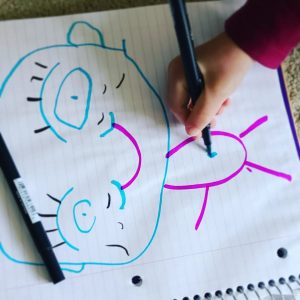When There’s More Than One: Sibling Solutions
April 10th is National Sibling Day, something I only remember when people post photos of their siblings on social media every year.

This year, it encouraged me to reach out to other families for their stories and experiences, and reflect on my own experiences educating multiple ages at once.
The truth is, if you ask 100 families how they home educate siblings, you will get 100 different answers. On the surface, many of them may look the same. However, as each family is unique in so many ways, there are small yet significant differences that exist.
This is all compounded by the complex and dynamic relationships that exist in the sibling world. Stepsiblings, half-siblings, new siblings, old siblings; ones you like, ones you don’t, ones you live with, and ones that visit occasionally. All of this adds layers and individuality to the experience.
So with all of that said, how do I and a few of our members, navigate educating siblings?
Gina A. uses their alternate sleep schedules to her benefit: “I let my middle schooler sleep in & do my elementary kiddos’ school while the big one is still asleep. Then when he gets up (he is mostly independent) I can help him if he needs it.”
Megan S. adds an element of strewing to her home education: “I’ve recently started doing little stations around the house. So the kids can rotate to an activity like art, play-doh, matching games, writing letters, sensory bin kind of things while I work one on one for math or language arts/reading. We tend to do science, nature study, and the rest together.” (Read more about strewing here)

Catina S. has more of a “we’re in this together” vibe. “We never separated curricula by age but worked on whatever the kids were interested in at whatever level they were at. Sometimes they would work together, sometimes they weren’t interested in what the other one was doing and they would do something else. Frequently they taught each other and shared their interests. We approached problem-solving as a team, instead of letting the problem get in between us.”
Personally, I use elements of each of these and more. I encourage my kids to teach each other. If they’re asking questions I know another has recently read something about, I send them to that sibling. “Your sister was just looking that up, I’m sure she could share some great information with you!” I set one or the other up with an activity so I can focus on another.

More importantly than how you educate with siblings, I feel you need to know that sometimes it is okay to admit that today isn’t the day, skip the lessons, and do something different. With multiple personalities and needs and wants, some days (or weeks…or months) just won’t line up perfectly. Have a bag of tricks. A list of places you love, activities you know everyone will enjoy, or movies you’ve been meaning to watch. When things get stressful, it may be hard to find a reset button, so having a list of options is helpful. One of our favorite resets is community drawing. Each child has a marker and takes a turn adding just a line or two to a drawing until they all deem it complete.
Tell us about your family! How do you manage multiple children in your home education? We’d love to hear any more tips or tricks you have!
Jess Koller has been home educating her three children since Kindergarten and is now entering her 5th year. She also works part-time as an oncology nurse. She has two bachelor’s degrees in psychology and nursing. She and her family enjoy being outdoors, camping, hiking, fishing, and kayaking. She enjoys crafting and reading in her spare time and has recently found a love for woodwork and furniture building.
Opinions expressed by individual writers in this blog do not necessarily reflect the views of the Board of Directors of The Organization of Virginia Homeschoolers, nor do they represent an official position of VaHomeschoolers. Writers’ views are their own, and readers are encouraged to research and explore homeschooling issues to their own satisfaction.
